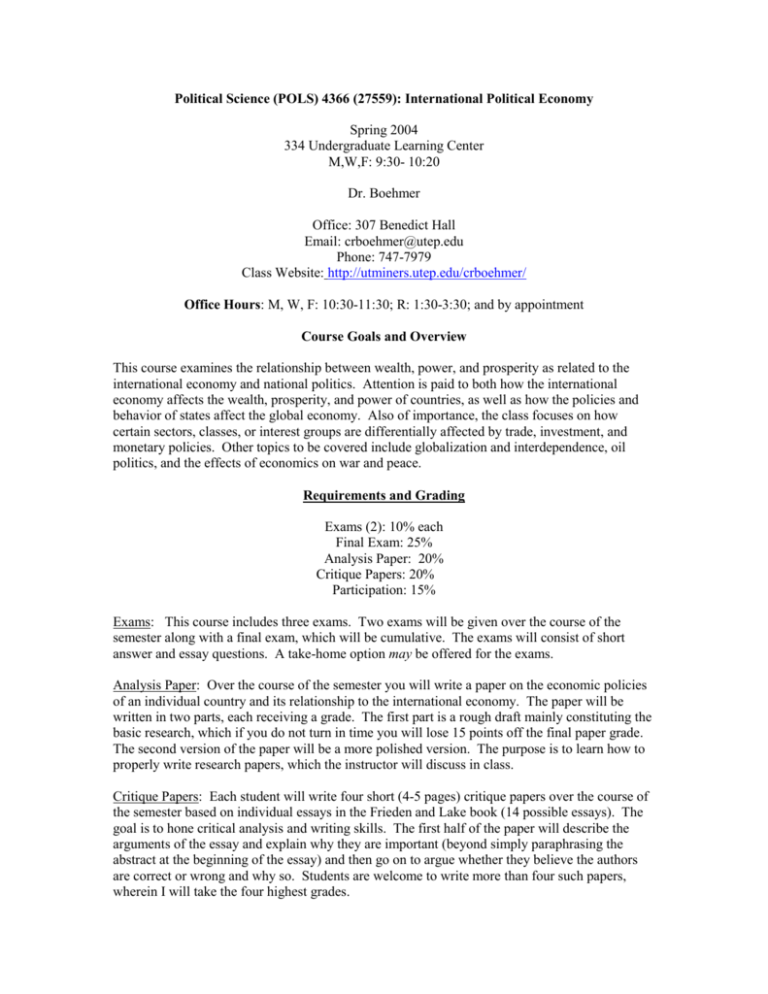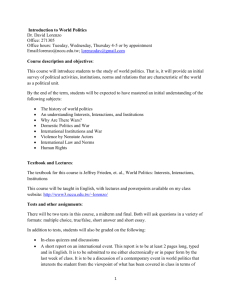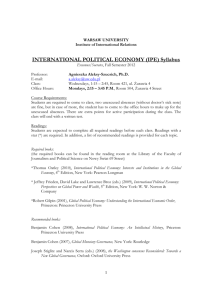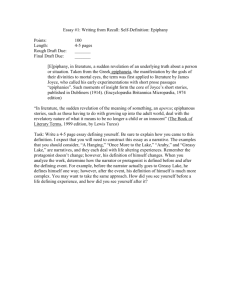
Political Science (POLS) 4366 (27559): International Political Economy
Spring 2004
334 Undergraduate Learning Center
M,W,F: 9:30- 10:20
Dr. Boehmer
Office: 307 Benedict Hall
Email: crboehmer@utep.edu
Phone: 747-7979
Class Website: http://utminers.utep.edu/crboehmer/
Office Hours: M, W, F: 10:30-11:30; R: 1:30-3:30; and by appointment
Course Goals and Overview
This course examines the relationship between wealth, power, and prosperity as related to the
international economy and national politics. Attention is paid to both how the international
economy affects the wealth, prosperity, and power of countries, as well as how the policies and
behavior of states affect the global economy. Also of importance, the class focuses on how
certain sectors, classes, or interest groups are differentially affected by trade, investment, and
monetary policies. Other topics to be covered include globalization and interdependence, oil
politics, and the effects of economics on war and peace.
Requirements and Grading
Exams (2): 10% each
Final Exam: 25%
Analysis Paper: 20%
Critique Papers: 20%
Participation: 15%
Exams: This course includes three exams. Two exams will be given over the course of the
semester along with a final exam, which will be cumulative. The exams will consist of short
answer and essay questions. A take-home option may be offered for the exams.
Analysis Paper: Over the course of the semester you will write a paper on the economic policies
of an individual country and its relationship to the international economy. The paper will be
written in two parts, each receiving a grade. The first part is a rough draft mainly constituting the
basic research, which if you do not turn in time you will lose 15 points off the final paper grade.
The second version of the paper will be a more polished version. The purpose is to learn how to
properly write research papers, which the instructor will discuss in class.
Critique Papers: Each student will write four short (4-5 pages) critique papers over the course of
the semester based on individual essays in the Frieden and Lake book (14 possible essays). The
goal is to hone critical analysis and writing skills. The first half of the paper will describe the
arguments of the essay and explain why they are important (beyond simply paraphrasing the
abstract at the beginning of the essay) and then go on to argue whether they believe the authors
are correct or wrong and why so. Students are welcome to write more than four such papers,
wherein I will take the four highest grades.
Participation: Students will be expected to participate in class discussions and debates outside
those assignments mentioned above. Part of each class will be devoted to lecture followed by
some discussion. The instructor especially appreciates quality, thoughtful comments and
questions. The instructor also reserves the right to provide pop quizzes to monitor whether
students are completing the readings, which will be included as part of your participation grade.
Other Expectations Concerning Class Conduct
It is expected of you that you do not miss assignments or classes. It has been demonstrated in
studies on education that attending class and especially taking good notes improve student test
scores. Class attendance is mandatory. If you know you will be unable to meet these
commitments, and you have a valid excuse, be sure to notify me in advance if possible. I will
require you to provide documentation when applicable for university approved absences and
missed assignments. Also, always be sure to back up any assignment you ever word process on a
disc for every class you ever take. Note that floppy disks seem especially prone to errors and you
may want to consider using CD or ZIP disk technologies. Last minute technical problems are not
a valid excuse for late assignments.
Debate and discussion are important in the critical evaluation of politics. Without this interaction
the subject matter may feel far removed from your life when in fact it is quite important. I expect
everyone to interact with other class members. Doing so will further enable you to learn the
subject matter. However, it must be remembered that the purpose of group and class discussion is
to improve individual learning and the overall quality of the course. This entails a respect for
others and refraining from disparaging remarks, personal insults, derogatory comments, and other
unprofessional behavior. Additionally, outside work and other non-class related activities have
no place in our class, this includes cell phones or other electronic equipment not pertinent to class
activities. Cell phones most be turned off!! Moreover, disruption by cell-phones, unless one is
expecting an emergency phone call, indicates that the activity under way is secondary to other
pursuits. Please feel free to drop by my office during office hours if you have any additional
questions or concerns. I urge you to take advantage of this opportunity. Questions are highly
recommended. I enjoy such interaction and you will also gain from it.
Plagiarism (Read this disclaimer and avoid trouble!!!)
An unpleasant topic that we need to discuss is plagiarism. Briefly, plagiarism entails the use of
other people’s words, songs, or images without their consent or without documentation. For the
papers in this class, students must provide footnotes or endnotes for passages in the text that are
borrowed or inspired by other person’s works. It is not hard to avoid plagiarizing -- if you use a
quote from someone, acknowledge it in a footnote; if you paraphrase or summarize an argument,
cite the source from where you got the idea. Often parenthetical cites are useful for this purpose.
For example, one might write “One compelling reason why governments do what they do is that
all people have goals, and they work to achieve those goals through political behavior. (Lowi,
Ginsberg, and Shepsle 2002, p.14)”, and then cite the work again in a bibliography or reference
section at the end of your paper. If you use facts or figures from some source and they are not
common knowledge, note the source of the information. Copying and pasting in text from
websites or other electronic documents is completely unacceptable unless some reference is
provided. If you directly borrow sentences, or even clauses or sentence fragments, these should
be set-off in quotation marks and include a reference to the original source. If you are inspired to
borrow the style, organization, or ideas of other person’s work you will still need to provide
references to specific passages and bibliographical information. Another strategy that is
acceptable is to paraphrase other person’s work, which is fine again as long as the source is noted
in the text. It is not acceptable to include multiple paragraphs or long passages not set off as
block quotes and then provide a single reference of the original source at the end. This is totally
unacceptable. The goal of writing is to use your own words and ideas first and foremost, and use
other people’s words as examples or evidence. Moreover, when students plagiarize it is often
obvious to the instructor.
Also, UTEP takes steps through the web and in University classes to inform students
about plagiarism. Thus, it is your responsibility to avoid this behavior. I join the University in
taking plagiarism very seriously. If caught plagiarizing, I will report you for college review and
possible discipline. I have reported several people in the past. Similarly, all other forms of
cheating are also dishonest and will not be acceptable.
Special Circumstances
The University of Texas, El Paso encourages qualified persons with disabilities to participate in
its programs and activities. If you anticipate needing any type of accommodation in this course
or have questions about physical access, please tell the instructor as soon as possible. I will do
my best to make special arrangements for students with any required special needs or conflicts as
far as course lectures or test-taking circumstances. However, if you anticipate a particular
requirement, let me know as soon as possible. I will always try to accommodate legitimate
needs, but I am unlikely to accommodate last minute requests. Special circumstances include
disabilities and any scheduled activities that you have that conflict with this class. If you do not
notify me of conflicts early on, I am under no obligation to allow you a make-up exam or
assignment extension. Emergencies such as deaths in the family or illness must be
documented.
Readings
I expect you to read everything listed on the syllabus for a particular date before class. The
lectures will not necessarily duplicate the readings. Nonetheless, you will be responsible for this
subject matter on quizzes, exams, and papers and the tests will encompass more than the subject
matter covered in lecture. The texts for this course are:
Frieden, Jeffry A., and David A. Lake. International Political Economy: Perspectives on
Global Power and Wealth, 4th edition. Bedford/St. Martins Press.
Grieco, Joseph M., and John G. Ikenberry. State Power and World Markets. Norton.
Oately, Thomas. International Political Economy: Interests and Institutions in the
Global Economy. Pearson/Longman.
The following course outline is organized by sections of subject matter. Readings are assigned by
specific topics. I have focused the readings to ensure that you read what is most important for
this course. Some readings are short while others are longer. I expect you to take the time
necessary to think about what you are reading, not just quickly skim the pages. If you have any
questions about the subject matter, be sure to raise them in class or during office hours and
appointments.
Schedule of Classes
I.
Introduction to International Political Economy: Theories and Trends
a. Defining International Political Economy and Levels of Analysis (week 1/12)
i. Frieden and Lake, Introduction (not for Critique Papers)
ii. Oately, Chapter 1
iii. Grieco and Ikenberry, Chapter 1
b. Power, Imperialism, and Hegemonic Stability Theory (week 1/19)
i. Grieco and Ikenberry, Chapter 4
ii. Frieden and Lake, Essay 1 (not for Critique Papers)
iii. **Exam #1 (1//26)**
II.
The Politics of Trade
a. Liberal Logic of Markets and Comparative Advantage – State and System Foci
(weeks 1/26- 2/2)
i. Grieco and Ikenberry, Chapter 2
ii. Oatley, Chapter 2
iii. Frieden and Lake, Essay 5
b. Trade Policy and Economic Sectors and Interest Groups (week 2/2 to 2/9)
i. Oatley, Chapter 3
ii. Frieden and Lake, Essays 2 and 22
c. Logic of Trade Protectionism – State and Sectors Foci (week 2/9 to 2/26)
i. Frieden and Lake, Essay 19
ii. Review Grieco and Ikenberry, Chapters 2 and 4
d. WTO, NAFTA, and other Free Trade Blocs and Organizations (week 2/23)
i. Review Oatley, Chapter 2
ii. Frieden and Lake, Essay 24
iii. **Exam #2 (2/27)**
III.
The Politics of Money
a. The International Monetary System (week 3/1)
i. Oatley, Chapter 6
ii. Grieco and Ikenberry, Chapter 3
b. Domestic Politics and Exchange Rate Policy (week 3/8)
i. Oatley, Chapter 7
ii. Frieden and Lake, Essays 15, 16, and 28
c. Developing Countries and International Finance (week 3/22)
i. Oatley, Chapter 8
ii. **Rough Draft of Country Analysis Paper due (3/22)**
IV.
The Politics of Globalization and Interdependence
a. Economic Globalization and Political Backlash (week 3/29)
i. Grieco and Ikenberry, Chapter 7
ii. Frieden and Lake, Essays 30 and 31
b. Developing Nations and the World Economy (week 4/5)
i. Oatley, Chapter 4
ii. Grieco and Ikenberry, Chapter 8
iii. Frieden and Lake, Essay 27
c. The Role of MNCs (week 4/12)
i. Oatley, Chapter 5
ii. Frieden and Lake, Essays 4, 10, and 11
d. International Economic Integration and Institutions (week 4/19)
i. Grieco and Ikenberry, Chapter 9
e. The Politics of Oil and other Strategic Resources (4/26)
i. TBA
f. Interdependence, War, and Economic Statecraft (4/26)
i. Grieco and Ikenberry, Chapter 6
Finals Week: Final Exam on Wednesday, May 5 from 10:00-12:45






